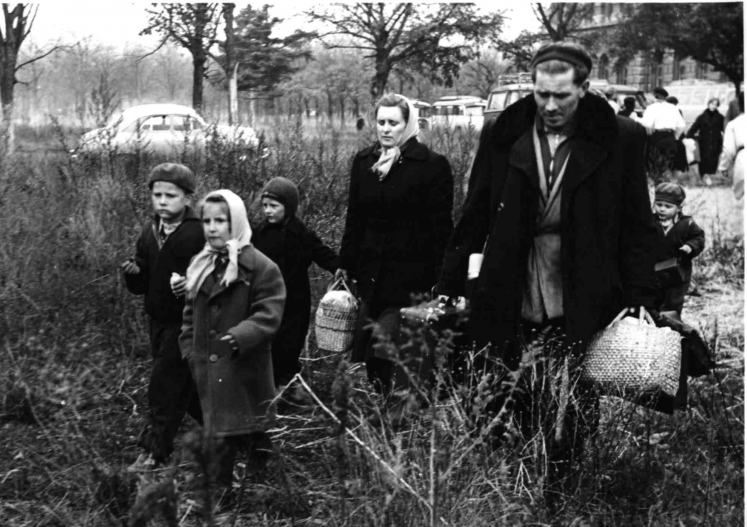Jeden z nejprestižnějších světových grantů ERC bude řešen v Masarykově ústavu a Archivu AV ČR
Historik Masarykova ústavu a Archivu AV ČR Michal Frankl získal jeden z nejprestižnějších světových grantů ERC (Evropská výzkumná rada) ve výši téměř dva miliony euro. U mezinárodní komise uspěl se svým projektem nazvaným Neočekávané útočiště? Uprchlíci a občané ve středovýchodní Evropě ve 20. století.
Během následujících pěti let povede Frankl mezinárodní tým složený z historiků srovnávajících, jakým způsobem byli v Polsku, Československu, Rakousku, Maďarsku a Jugoslávii (a jejich následnických státech) definováni a diskutováni, tříděni a přijímáni uprchlíci. Výsledkem grantu bude kniha a řada dílčích studií, dále workshopy, konference a z nich vzniklé sborníky.
„Projekt se snaží vepsat uprchlíky zpátky do dějin středovýchodní Evropy 20. století,“ píše Frankl v žádosti, kterou připravoval dva roky. Podle historika středovýchodní Evropu 20. století většinou vnímáme spíše jako místo, odkud se odchází. Navíc jednotlivé skupiny uprchlíků současníci a pozdější historici vnímali hlavně jako izolované politické a národní exilové skupiny.
Franklovi chybí především diskuse o tom, co znamená poskytování azylu a jak uprchlíci ovlivňují společnost. „V knize Nejisté útočiště jsme spolu s historičkou Kateřinou Čapkovou popsali též tvrdý přístup československých úřadů po anšlusu Rakouska, které zejména židovským uprchlíkům prakticky uzavřely hranice. Čekali jsme, že to tady vzbudí nějakou diskusi o tom, jak se má v takových situacích demokracie zachovat. Ale nic takového nenastalo – v kontrastu s debatami o švýcarské, britské či americké uprchlické politice v době holokaustu. Jako bychom na Československo či země na východě kladli jiné nároky. I proto jsem se pustil do přípravy projektu ERC,“ vysvětluje Michal Frankl.
Jeho komparativní projekt obsáhne celé dvacáté století: od první světové války a vytváření národních států, přes uprchlíky na konci 30. let a období holocaustu, až po éru studené války a postkomunistická 90. léta. Umožní tak sledovat přístup k uprchlíkům v delším období a ve velkém regionu poznamenaném kromě jiného národnostními konflikty a etnickými čistkami, válkou a okupací, stejně jako obdobím státního socialismu. „Jednou z inovací projektu je porovnání útěku na svobodný západ s azylem v komunistickém bloku, například pro uprchlíky z Řecka,“ dodává Frankl.
Oficiální výsledky soutěže:
https://erc.europa.eu/news/erc-2018-consolidator-grants-results
Kontakt:
Michal Frankl, PhD.
Email: frankl@mua.cas.cz
-----
ERC grant for a Czech scientist for research into the history of refugees in East-Central Europe
The historian of the Masaryk Institute and Archive of the Czech Academy of Sciences Michal Frankl has received funding from the ERC (European Research Council), one of the most prestigious scientific grants in the world, in the amount of almost two million Euros. He was successful with the international commission with his project called Unlikely refuge? Refugees and citizens in East-Central Europe in the 20th century.
Over the next 5 years, Frankl will lead an international team of historians comparing the way in which refugees were defined and discussed, categorised and received in Poland, Czechoslovakia, Austria, Hungary and Yugoslavia (and their successor states). The results of the grant will be a book publication and a series of studies, but also workshops, conferences and the proceedings created from them.
“The project aims to write refugees back into the history of East-Central Europe in the 20th century,” writes Frankl in his ERC application, which he prepared for two years. According to the historian we mostly perceived East-Central Europe of the 20th century as place to leave rather than a refuge. Moreover, the individual groups of refugees were seen by contemporaries and later historians mainly as isolated political and national exile groups.
In particular, Frankl is missing a discussion on what it means to provide asylum and how refugees influence society. “In the book Uncertain Refuge, together with the historian Kateřina Čapková, we examined the harsh approach of Czechoslovak authorities after the Anschluss of Austria, leading to the closure of the borders to Jewish refugees. We expected that it would evoke a discussion on how a democracy should act in such situations, but nothing like that happened – in contrast with the debates on Swiss, British or American refugee policies during the Holocaust. As if we placed other demands on Czechoslovakia or the countries of the East. It was also for this reason that I started the preparation of the ERC project,” explains Michal Frankl.
His comparative project spans the entire twentieth century: from World War I and the creation of nation states, through the end of the 1930s and the period of the Holocaust, to the era of the Cold War and the post-communist 1990s. It will allow comparative research on refugees over a long period of time and in a large region, which is marked, inter alia, by national conflicts and ethnic cleansing, war and occupation, as well as the period of state socialism. “One of the project’s innovations is the comparison of escape to the free West and asylum in the Communist Bloc, for instance for refugees from Greece,” adds Frankl.
A list of all selected projects and researchers:
https://erc.europa.eu/news/erc-2018-consolidator-grants-results
Contact:
Dr. Michal Frankl
Email: frankl@mua.cas.cz
